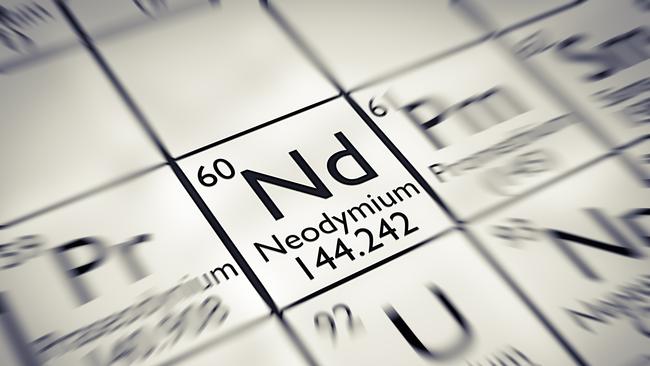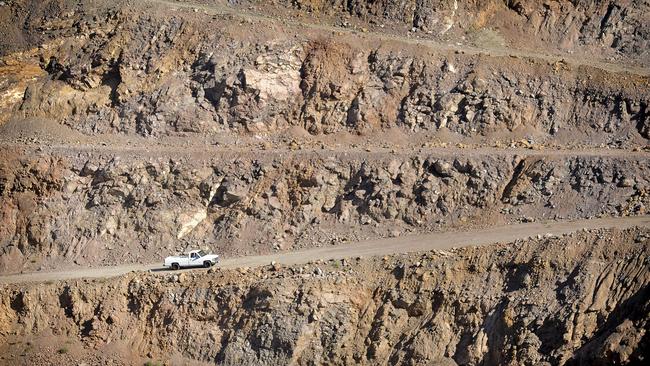
As Peak Rare Earths nears its final financing decision on whether to move ahead with the development of its massive African rare earths deposit, Chinese state-backed investor Shenghe Resources recently snapped up a 20 per cent stake in the Australian company.
Rare earths, as the name suggests, matter. They are a range of metals used in high-end electronics including smart phones, wind turbines, solar panels and electric vehicles, and they’re in hot demand.
They are also increasingly used in defence industries, with the US-manufactured F-35 stealth fighter using more than 400kg in every jet.
China controls about 80 per cent of the global supply of rare earths and wants to fortify this position with even more.
Not only has the global Covid pandemic put extraordinary pressure on supply chains, but Russia’s invasion of Ukraine has made geopolitics one of the top of risks for global manufacturers.

They worry the dominance of China in the supply of critical components means the supply tap could be turned on or off if current trade tensions take a turn for the worse.
It is understood some shareholders in Peak have urged Australia’s powerful Foreign Investment Review Board to review the Shenghe share acquisition. They’ve raised concerns about Shenghe’s support from the Chinese government at a time the superpower also dominates the rare earths market.
Shenghe’s holding in Peak (19.9 per cent) falls a fraction below the 20 per cent automatic foreign investment review threshold by FIRB. However, acquisitions of 10 per cent or more of an Australian company by a foreign investor are subject to review where a foreign government is in a position to “participate, influence or control” the management of the investor, according to FIRB’s own guidelines. An unfavourable ruling from FIRB could force Shenghe to sell its entire stake, worth $26m at current levels.
Sichuan-based Shenghe says it is a “global corporation” built around rare earths with a focus on R&D and production.
With a market capitalisation of a little over $5bn, Shenghe says it has been growing in line with China’s industrial policies and on its website it describes its equity structure as “mixed”.
It is listed on the Shanghai Stock Exchange and according to corporate filings its biggest single shareholder is the Chinese Academy of Geological Sciences, which is overseen by China’s land and resources ministry. It also has backing at the Sichuan government level.
Peak is in the final stages of a feasibility study and early works for the $365m Ngualla project in Tanzania, which represents one of the largest highest grade undeveloped rare earth projects in the world.
Peak plans to develop the mine, which has an estimated 20 year life, and produce high-grade concentrate which will be shipped to the Teesside refinery it plans to construct in the northeast of England.
The Tanzanian mine is rich in neodymium and praseodymium (NdPr) oxide for the hi-tech magnet market, used in the production of electric vehicles and wind turbines, which represent some of the fastest-growing tech markets.
China accounts for as much as 90 per cent of global NdPr oxide production, with Peak’s customers including companies in South Korea, Japan and Europe looking for new supply sources.
Critical resource
‘Critical minerals’
Adding to the case for foreign investment scrutiny, the Morrison government has identified rare earths as part of a range of “critical minerals” that includes lithium. It wants to develop resources that can shift the world from relying on Chinese sources.
This includes a $1.3bn fund to encourage manufacturers and the processing of rare earths under a 10-year road map for the sector, which also includes a critical minerals working group with the US and British governments.
Just last week while in Western Australia, the Prime Minister outlined $243m in funding for four domestic projects, which he said would help protect the nation’s supply of critical minerals.

Because the Peak deposit is outside Australia, it can’t qualify for the funding, but it is understood the company, which is headquartered in Perth, still regards itself as aligned with the broader Australian critical minerals strategy – the development of non-Chinese-aligned production to diversify the global supply chain.
Shenghe has come in focus previously for its investment in US miner MP Materials, which operates the only rare earths mining and processing site of any scale in North America.
In corporate filings, MP Materials says it sells “the vast majority” of its rare earth concentrate to Shenghe.
Shenghe has links with another ASX-listed company, Greenland Minerals, with a 9 per cent stake.
The company is developing a rare earth project in Greenland.
At the time it made the Greenland investment in 2016, Shenghe applied to FIRB and secured approval for its investment.
While Shenghe has indicated its support for Peak’s Tanzanian deposit, it is understood to be cooler toward the British leg of the project, which is the refining of the rare earths at Teesside.
Peak’s own analysis maintains that its integrated refining model would deliver higher returns, particularly given the strong run-up in NdPr oxide prices. Under Shenghe’s other agreements, including with MP Materials, rare earths concentrate is shipped into China for refining. Greenland Minerals says it is working “under guidance” of Shenghe on its refining strategy.
Shenghe moved into Peak earlier this year when a US-headquartered fund, Appian Pinnacle Holdco, sold its entire holding off market. But that transaction hasn’t come under any scrutiny by FIRB.
In signing up customers Peak has highlighted its position as a non-Chinese long-term supply source. But the presence of Shenghe is understood to have unsettled some. Peak is increasingly being asked about the Chinese holding as it talks with new customers.
For its part, Peak is advising customers and other investors that even with the shareholding, nothing has changed in terms of its non-China-aligned focus. “Peak believes its position as an independent source of production is important to offtakers, financiers and other stakeholders,” it has previously told investors.
Shenghe is understood to have asked for a seat on Peak’s board but the Australian company has firmly knocked back the request. Peak has told investors that “it is not entertaining any changes to its board, governance or management structure”.
johnstone@theaustralian.
com.au


An ASX-listed mining hopeful with access to a rich resource of hard-to-come-by minerals has a big problem.